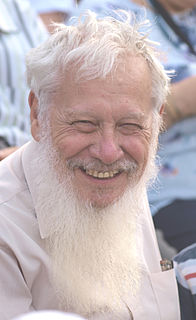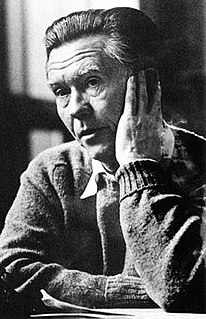A Quote by Carl von Clausewitz
The invention of gunpowder and the constant improvement of firearms are enough in themselves to show that the advance of civilization has done nothing practical to alter or deflect the impulse to destroy the enemy, which is central to the very idea of war.
Related Quotes
You have to know accounting. It's the language of practical business life. It was a very useful thing to deliver to civilization. I've heard it came to civilization through Venice which of course was once the great commercial power in the Mediterranean. However, double entry bookkeeping was a hell of an invention.
GUNPOWDER, n. An agency employed by civilized nations for the settlement of disputes which might become troublesome if left unadjusted. By most writers the invention of gunpowder is ascribed to the Chinese, but not upon very convincing evidence. Milton says it was invented by the devil to dispel angels with, and this opinion seems to derive some support from the scarcity of angels.
I'm not so sure he's wrong about automobiles," he said, "With all their speed forward they may be a step backward for civilization-that is, spiritual civilization ... But automobiles have come, and they bring a greater change in our life than most of us expect. They are here, and almost all outward things are going to be different because of what they bring. They are going to alter war, and they are going to alter peace.
For all that we have done, as a civilization, as individuals, the universe is not stable, and nor is any single thing within it. Stars consume themselves, the universe itself rushes apart, and we ourselves are composed of matter in constant flux. Colonies of cells in temporary alliance, replicating and decaying and housed within, an incandescent cloud of electrical impulse and precariously stacked carbon code memory. This is reality, this is self knowledge, and the perception of it will, of course, make you dizzy.
A living creature develops a destructive impulse when it wants to destroy a source of danger... The original motive is not pleasure in destruction... I destroy in a dangerous situation because I want to live and do not want to have any anxiety. In short, the impulse to destroy serves a primary biological will to live.
I am convinced that love is the most durable power in the world. It is not an expression of impractical idealism, but of practical realism. Far from being the pious injunction of a Utopian dreamer, love is an absolute necessity for the survival of our civilization. To return hate for hate does nothing but intensify the existence of evil in the universe. Someone must have sense enough and religion enough to cut off the chain of hate and evil, and this can only be done through love.
It is often asserted that woman owes all the advantages of the position she occupies to-day to Christianity, but the facts of history show that the Christian Church has done nothing specifically for woman's elevation. In the general march of civilization, she has necessarily reaped the advantage of man's higher development, but we must not claim for Christianity all that has been achieved by science, discovery and invention.
It is a very great mistake, and a very common one, even for well-read persons, to adopt the idea that the progress of the human race in the science of government, in the arts of civilization and refinement, and in the establishment of morality and religion, has been constantly and steadily towards improvement and perfection.




































